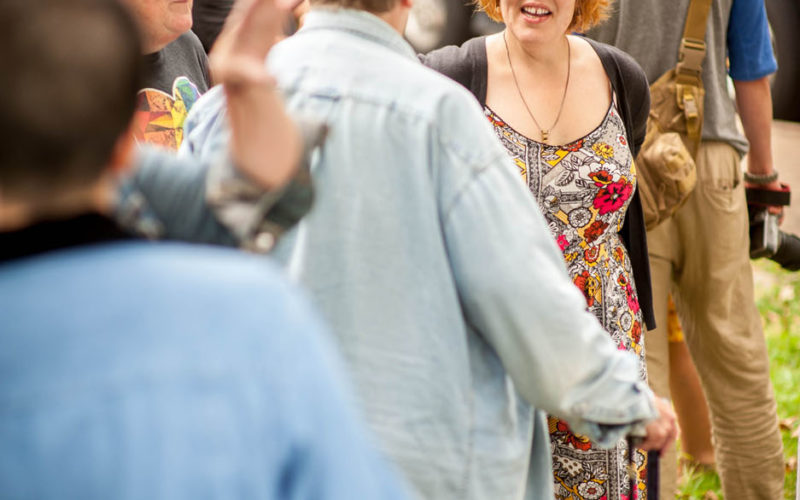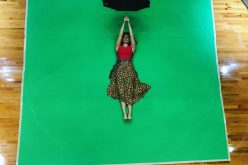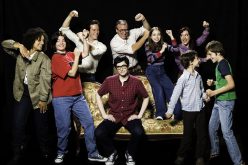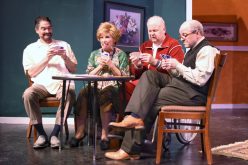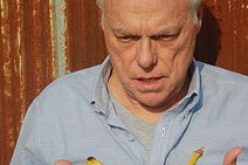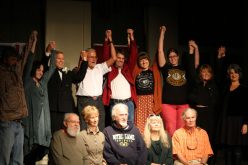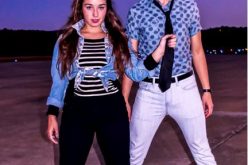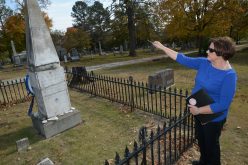Actor, director, facilitator, artistic director of Artist’s Laboratory Theatre
Q. When you were selected, what effect did you want to have on the arts in Northwest Arkansas?
A. At the time, I knew I wanted to make theater that had purpose and relevance to our community and that would make a positive impact. … We were producing “Sunday Night Service,” a radio show for KUAF. We were writing an audio experience called “The Secret Life of Downtown Fayetteville.” We had offices at the time on the square and rented out dance studios and warehouses to rehearse.

NWA Democrat-Gazette/Lara Jo Hightower
Erika Wilhite is pictured at an Artist’s Laboratory Theatre community event in South Fayetteville in September of this year.
When the time came for our lease renewal, I saw a property come up for rent in South Fayetteville: the Christadelphia Church on South College, which had been renovated and included a spacious administrative space in the back in addition to the studio space in the front where the church services were held. We moved into our new home, “the Lab,” in September of 2016 and in the spirit of learning about our new neighborhood — and also to glean the interests of our South Fayetteville residents — we hosted a “Listening Party,” a facilitated dialogue through which we asked “What are the characteristics of South Fayetteville? What are the virtues? The challenges? The contemporary history?”
The neighbors who attended the party gave us some valuable information through their perception of the neighborhood. People were worried about many things and proud of many things. One of the biggest concerns was for individuals experiencing homelessness, those who live in the woods and receive services in the area — those very visible to us in South Fayetteville. Following that Listening Party, a neighbor returned and requested we facilitate a conversation on the issue of homelessness in South Fayetteville. … That is when Artist’s Laboratory Theatre signed up to produce a two-year project called the South Fayetteville Civic Lab, through which we developed a play about the issue of homelessness called “The Good Person of South Fayetteville.” So in December of 2016, I knew I wanted to impact this issue through the act of making theater.
Q. How did that turn out?
A. In addition to neighborhood focus groups with people experiencing many different stages of housing insecurity, we have worked with Neighborhood Ambassadors to identify needs and issues in the area. We partnered with Ozark Regional Transit on research. We interviewed riders and took experimental bus rides. We learned about the barriers people experience which prevented them from getting and keeping employment that provided a livable wage. We learned how easily people can become homeless in this area, and how most people are experiencing a stage of housing insecurity whether they realize it or not. Through our research process we learned about how hard some people have it while this region seems to be experiencing great abundance and growth. We used our facilitation skills to establish ourselves as stakeholders in the community of South Fayetteville — not just observers or documentarians, but residents ourselves.
Q. What else have you added to your plate since 2014?
A. Since 2014, we’ve hired a five-person full-time staff, established a full-time outreach program, and we’ve become community partners in projects with various social justice organizations such as the Workers’ Justice Center. We’ve fully committed to using our work to present dialogue around local issues through the perspective of our community.
Q. What do you want to accomplish over the next five years?
A. To continue to create community-centered artistic experiences that inspire action around complex social issues. To give voice to those whose voices aren’t heard. To draw attention to the issues surrounding the gentrification of our community. To create work of consequence that can entertain, inform and (hopefully) inspire!
— Lara Hightower
lhightower@nwadg.com

